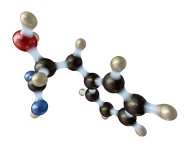You may have seen the warning on the label of a diet soda: Phenylketonurics – contains phenylalanine? Phenylketonurics, referring to people with Phenylketonuria (PKU) which is a genetic disease that affects the metabolism of the amino acid, phenylalanine. The condition inherits as an autosomal recessive condition or a condition which manifests only when both parents are carriers of the defective gene. Apart form this, the condition can manifest in variable intensities and many of the children would be suffering from either the mild disease or at moderate levels.
 Phenylalanine is an amino acid contained in proteins such as meats, milk, cheese as well as in nuts. Children who inherit the disease, will be having a defective enzyme that is suppose to metabolize this amino acid and thus would not be able to keep the phenylalanine levels within the safe and at necessary levels. Even though phenylalanine is an essential amino acid for the body, the excess accumulation will harm certain tissues and out of which, the brain tissues will be the most susceptible.
Phenylalanine is an amino acid contained in proteins such as meats, milk, cheese as well as in nuts. Children who inherit the disease, will be having a defective enzyme that is suppose to metabolize this amino acid and thus would not be able to keep the phenylalanine levels within the safe and at necessary levels. Even though phenylalanine is an essential amino acid for the body, the excess accumulation will harm certain tissues and out of which, the brain tissues will be the most susceptible.
Usually, the newborns in certain countries are screened for ‘Phenylketonuria’ and its early identification would enable the control of body phenylalanine levels by ways of restricting foods. But, if this was not possible, such babies will develop signs and symptoms related to the disease in few months time.
Thus, the accumulated phenylalanine levels will give rise to following symptoms.
*Mental retardation
*Developmental delays
*Fits
*Social problems and restless behaviors
The damage caused to the brain tissues will result in defective signal transmission and brain function which will lead to learning difficulties. The parents will notice the child being delayed in achieving their developmental milestones when compared to the child’s siblings or else to other same aged children. Apart form this, it is possible for the child to develop fits or else abnormal movements of the limbs as in ‘epilepsy’ type of seizures.
*Growth retardation which will be demonstrated by stunting
*Poor growth of the head which leads to ‘microcephaly’
In children with ‘phenylketonuria’, the gaining of height would be noticeably reduced and the brain growth would also be less as depicted by small head circumference.
*Skin and hair discoloration or paleness
*Unusual smell in the babies breath
Phenylalanine will be contributing to the formation of melanin and its absence would mean that the hair color or the tone as well as the skin color would appear much paler. The same can be detected in the eyes as is depicted by blue sclera in some children with the disease.
Out of all, the effect on the neurological development would be detrimental to the growing child and the consequences would make such children to be dependent throughout life unless continuous dietary restrictions are maintained.
Even such complications are prevented in the childhood, there is a possibility of suffering from excess accumulation of phenylalanine in later life or else if pregnant, the excessive blood phenylalanine levels can cause brain damage in the unborn baby.
Phenylketonuria Diet
Although there is no cure (yet), it can be managed through diet. So, what can she eat? Where does she get protein from to grow?
A powder has been developed that has all the nutrients patients need without the phenylalanine. It’s the version of milk.
A typical day’s diet is:
Breakfast: one cup of Rice Krispies with Rice Milk
Lunch: low protein Mac & Cheese, applesauce, veggie crackers, fruit chewies
Snack: low protein bread with jam
Dinner: Mock chicken fingers (made with low protein products), French fries, pickles
Yes, parents are limited in what they can give their child with this disease. And they have to order special bread (or make it from scratch), low protein cheese, low protein pastas and a few special low protein chocolates. They also have to track what she/he eats and how much she/he eats each day. Each item has a certain amount of phenylalanine in it and she/he is allowed so much per day. If she or he gets too much one day, it must adjust the next day.
In addition, keep the Phenylketonuria diet simple, using lots of fresh fruit and vegetables and little or no preservatives. This diet has been specifically designed for children diagnosed with PKU and should not be used for a child without PKU. Children without PKU still need their protein. However, this diet just highlights the fruit and vegetable portion of any diet.

